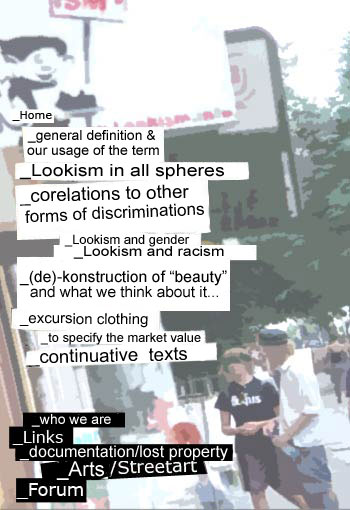
An excursion on clothing
Most likely everyone has had the feeling of being dressed “inappropriately” and thus has felt uneasy or even discriminated. Discrimination which is based on clothes( in the broadest sense make-up as well, etc.) exists on the one hand if people are perceived as “others” due to their lifestyle along with a certain type of clothing. Thus there is a certain form of degrading between different subcultures and scenes. But discrimination also exists within one scene, for instance if people are not able to match a certain internal beauty ideal and dress-code.
Clothing may not be a bodily trait, yet it is still connected to lookism. The body as well as the clothing play a major role in the process of determination of the market value of a person due to his_her outward appearance. So when checking a person's market value of attractiveness it is her_his whole outward appearance, clothes inclusive, which is being judged.Although clothes are not inborn, every human only has limited access to clothes due to her_his social status(*1). And clothing reveals power relations symbolically and rather concrete in the construction of certain clothes(*2).
Clothes are thought of as “beautiful” and “ugly” just like bodies(*3). But the content of the two above-mentioned terms changes even faster. The social “fashion trends” are fast moving and what was regarded as “beautiful” a year ago can easily be seen as “ugly” the following year.
Supposedly there are people who have “style”. These people wear the “right” clothes in the “right” combination with the “right” accessories and therefore they are clothed “beautifully”, which increases their market value. But the “right” style is not only defined differently at different points of time but also depend on one's socialization and scene affiliation. We think that you do not regard a certain type of clothing as “nice, just like that”, but your impression of “nice clothes” is always influenced by social/in-scene norms. Therefore we regard it as problematic to degrade people who cannot match the style of their peer group.(e.g. because they haven't got the financial ability or they do not want or understand the dominant clothing ideal)(*4).

Yet we notice that one can transport political statements via clothing (or other forms of body modification) and that clothing can even serve as a subversive practice.(e.g. clothes/make-up which disturbs/ bends the dominant sex/gender system). We also think that it can be reasonable to transport statements via clothing in certain cases and that it even is necessary to include this in the evaluation of a person.(e.g. in case of right-wing symbols or indisputably right-wing forms of clothing).
__________________________________________________
Links:
-Texts on women and clothing: “undressing dresses” http://www.isiswomen.org/pub/wia/wia302/undress.htm
(1) Only materially privileged people are able to wear clothes from prestigious brands. Thence they dissociate themselves from materially less privileged people.
(2) This also refers to social norms which oblige which clothes people wear.( e.g. women were expected to wear constricting corsets in former days).
(3) But clothing also serves to let someone seem competent/nice/inapprochable…
(4) „Queer Theory“ is also concerned about this point of critique. The exclusions of certain persons within a subculture are dealt with critically. Therefore “queer”, as a political concept, is also positioned against lookism: “Examples of standardization and norms within a subculture which are criticized by a queer movement are racism, biphobia, transphobia and discriminations which are based on the outward appearance of a person who does not match the beauty ideal of the scene (Lookism).” Quote from: http://www.haw-hamburg.de/sp/Standpunkt/treber/Bauer.htm